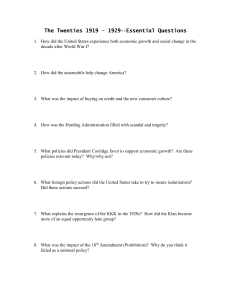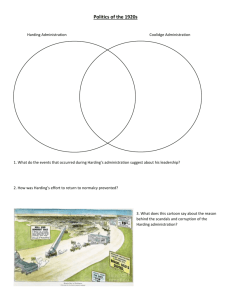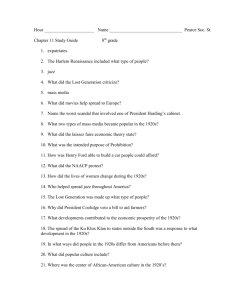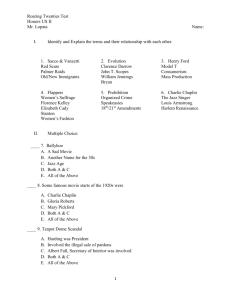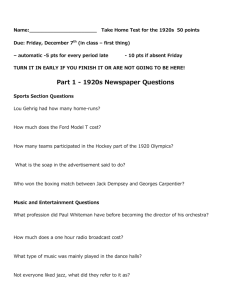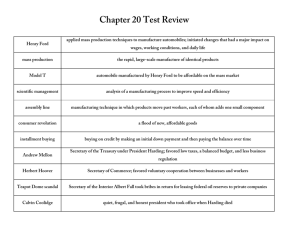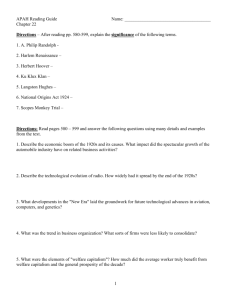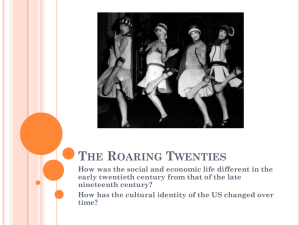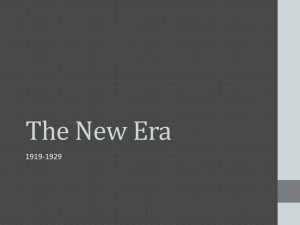Chapter 10 Power Point
advertisement
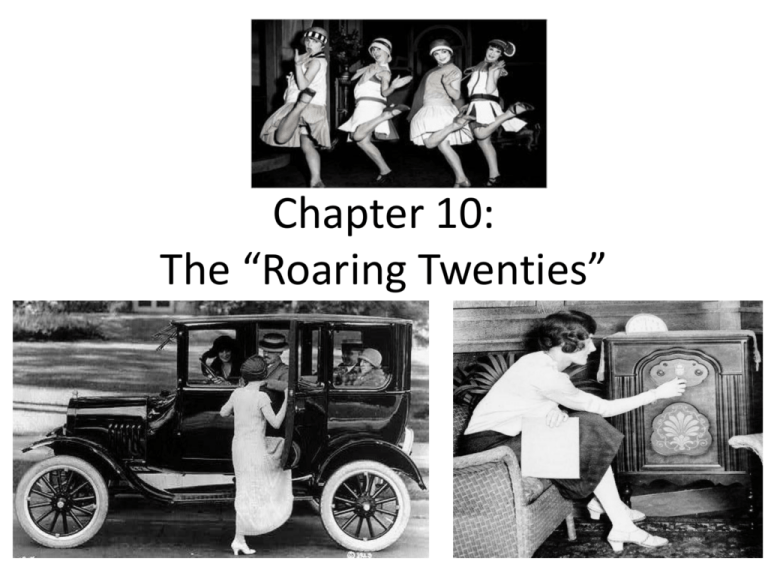
Chapter 10: The “Roaring Twenties” The End of Progressivism • Remember that at the end of The Great War Americans were ready to return to their isolationist and conservative roots • The Republican party came back very conservatively after the Bull Moose Party split • The Republican party controlled the White House in the 1920s Nativism in the 1920s • “Old Stock” Americans saw the seeds of sedition ( like socialism & anarchism) with the foreign-born • Emergency Immigration Act of 1921 • The Immigration Act of 1924 • These laws favored immigrants from northern and Western Europe Nativism & Sacco and Vanzetti • May 5, 1920 they were arrested for killing two men and stealing $16,000 • Both were Italian-born anarchists • They were sentenced to death & executed • Even though there was doubt as to their guilt Nativism & the Ku Klux Klan • The New Klan wanted 100% Americanism • Membership restricted to native-born, white Protestants (WASP) • They were against African Americans, Roman Catholics, Jews, & immigrants • At its peak in 1924, it had 4 million members Harding said the nation needed to “return to normalcy” • After World War I most Americans were weary of Wilson’s crusading idealism & wanted isolationism • There was a post-war recession 1919-1922 • Harding favored laissez-faire policies • Hawley-Smoot Tariff • Lower Taxes on Wealthy and Corporations • Lax Enforcement of Antitrust Laws and Regulations President Warren Harding Attempts at Disarmament & To Outlaw War • Harding sponsored the Washington Navel Conference and US membership in the World Court • Five-Power Treaty (1922) • Four-Power Treaty • Nine-Power Treaty • The Kellogg-Briand Pact in 1928 The Kellogg-Briand Signing Harding to Silent Cal • One thing that Harding was a visionary during this era was Civil Rights • Harding dies in 1923 due to food poisoning • Calvin Coolidge was able to keep clear of the scandals that hurt the Harding Administration The 1924 Presidential Election Democrats finally got behind John W. Davis, after 103 ballots at their convention The Progressive Party and the Socialist parties both nominated Robert M. La Follette He received more votes than any other 3rd party Republican Calvin Coolidge won the election by keeping focus on La Follette b/c he was a communistic & socialist treat to the U.S. The Growing Consumerism of the 1920s • Home Entertainment was bolstered by the huge growth of the radio • People of the 1920s also bought a large number of automobiles & home appliances • Americans also went to motion pictures like never before in the 1920s Airplanes & Automobiles • Wright Brothers in Kitty Hawk NC – 1903 • Airplanes in WWI and the airmail • Charles A. Lindbergh & Amelia Earhart • Auto invented in 1895 but Ford makes cars affordable because of the moving assembly line Lindbergh Ford The Business of Farming • During the 1920s, agriculture remained the weakest sector in the economy • There was massive overproduction • Most farmers were struggling to survive • Congress passed the McNary-Haugen Bill twice but Coolidge vetoed it twice Setback for the Unions • With the Conservatives back in the White House and the progressives out of power Unions faired poorly • During this time labor unions lost about 1.5 million members The Gastonia Strike of 1929 Presidential Election of 1928 Democrat Al Smith New Yorker & Catholic Republican Herbert Hoover Protestant The Scopes Trail a.k.a. The Monkey Trail • Teacher John Scopes went against state law and tough evolution • William Jennings Bryan took his religiousfundamentalism & made it a crusade against evolution • The result of the trail in Tennessee was that Scopes was guilty Clarence Darrow & W.J. Bryan The Anti-Saloon League & Prohibition • By the 1910s the AntiSaloon League had become one of the most effective pressure groups in U.S. History • Prohibition had a racist element against Germans and Italians • They wanted to police the behavior of the poor, the foreign-born, and the working class Prohibition & the Rise of Organized Crime • Prohibition did not give birth to Organized Crime however, it did give criminals a huge source of new income • The rise of Speakeasies, bootlegging, hip flasks, and cocktail parties • Most celebrated gangster was Al Capone Al Capone The Roaring 20s:The Jazz Age • F. Scott Fitzgerald called the postwar era the Jazz Age b/c young people were willing to experiment • Jazz blended African and European musical traditions • This new music bubbled up from New Orleans to K.C., Memphis, NY, & Chicago The New Morality • The guardians of morality or the old timers were in shock b/c of this “Jazz Age” • Fitzgerald wrote about “petting parties” • Other writers informed the nation about the new woman w/ bobbed hair, heavy makeup, skirts above the ankle and smoke and drank Flappers The Great Migration • The movement of southern Blacks to the North began in 19151916 w/ the expanding war industries • The legal restrictions on immigration continued the movement in the 1920s • In the 1910s 323,000 blacks moved North • In the 1920s 615,000 blacks moved North The Universal Negro Improvement Association • Was lad by Marcus Garvey • Garvey told African Americas to liberate themselves from white culture • Garvey declared blacks should go to Africa and start their own republic • Many of Garvey’s ideas would reemerge later under the slogan of black power
